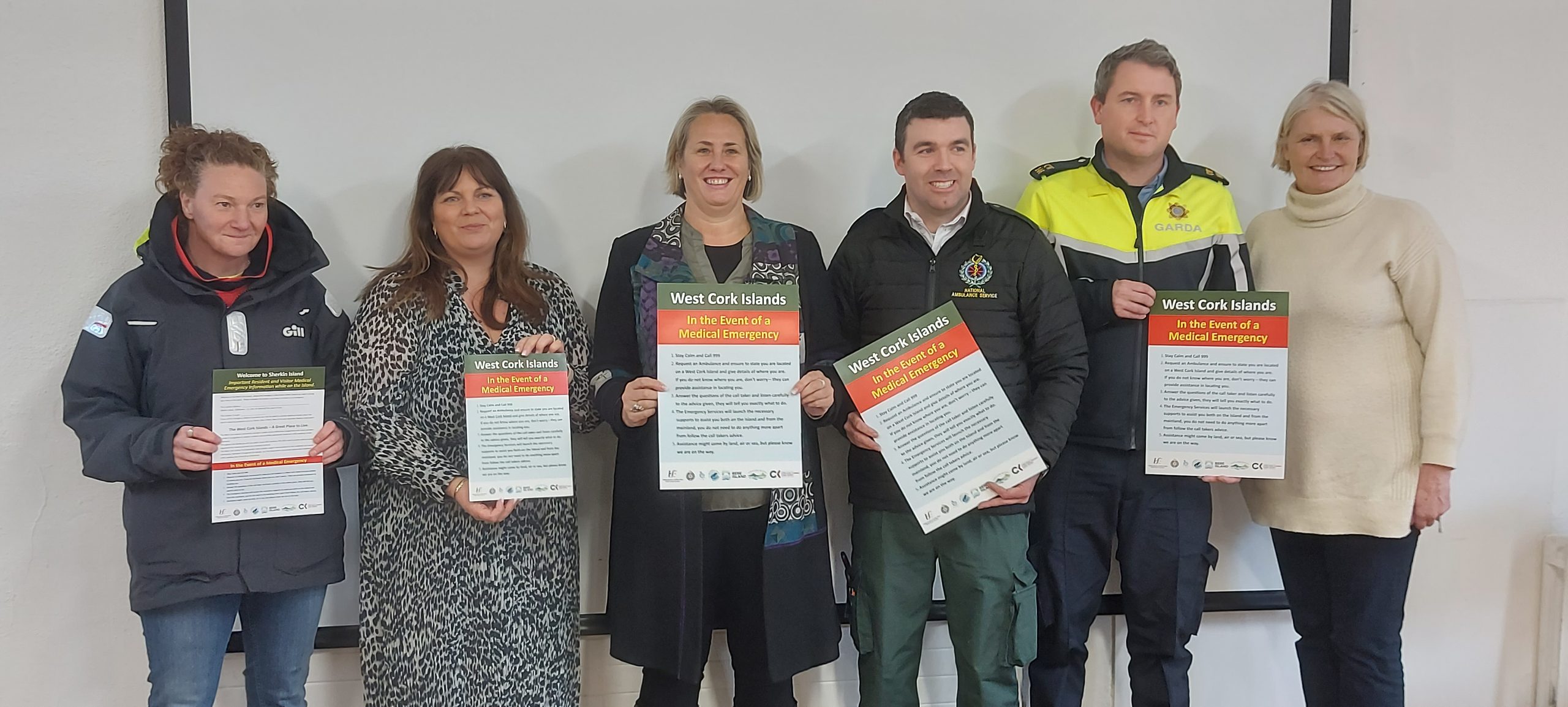Help support Cork Safety Alerts by becoming a member – Click Here
A new one-page document for residents and tourists, detailing what do in an emergency while on a West Cork Island, was launched on Sherkin Island on March 8.
The West Cork Islands Community Health Forum event was also used to thank Emergency First Responder volunteers for their efforts to support island health. The 10 volunteers, who initially trained as first responders, are the first in the country to go on to complete the PHECC Emergency First Responder Course – which provides significant aid for island residents and visitors in times of medical emergency need.

The West Cork islands – Sherkin, Cape Clear, Long, Heir, Whiddy, Bere and Dursey – are part of a national All-Ireland Islands HSE Primary Health Programme. The West Cork Islands have worked in partnership with Cork Kerry Community Healthcare (CKCH), HSE Cork South Community Work department and the emergency services to produce the information document on what do in an emergency.
The emergency information is aimed at:
- Resident islanders
- Holiday home residents
- Tourists and visitors
- Ferry services
Last year, CKCH, HSE, National Ambulance Service, Coast Guard and RNLI supported a demonstration on what happens in an emergency on an island. Community volunteers trained as First Responders and AED were purchased for the islands.
Head of Primary Care for CKCH Priscilla Lynch said:
I want to thank all on the West Cork Islands Health Forum – emergency sub group – for all their work in building local resilience and emergency skills to deal with different types of medical situations. The combination of enhanced first responders, AEDs on all the islands and a one-pager information card for all islanders/visitors is vital in times of a medical emergency; particularly cardiac arrest, chest pain, strokes and choking episodes
The newly-qualified Enhanced Community First Responders play a critical role if there is an emergency to ensure a safer, faster response – using the combined efforts of Coastguard, RNLI and ambulance. This will save lives and improve island health.
Thank you to the 10 volunteers and trainers, Moneen Collins and Catherine O’Sullivan, for hosting the first training of this kind in Ireland. Coming to the aid of a person in trouble while the ambulance is en route, buys time and will save lives. You are helping to make the beautiful West Cork Islands a safer and healthier place for all.
On the success of this programme, it is now envisaged that this initiative will be rolled out across the country, building resilience in all communities.
Judith Gilbert, project officer with Comhar na nOilean said:
Building community resilience is key in order to improve Ireland’s out-of-hospital cardiac arrest survival rates and the islands are no different in this regard. Having trained volunteer community First Responders is a lifeline for islanders. It’s great to have the backing of so many people to support island health.
Emer Shanley, Enhanced Community Care Network Manager, West Cork said:
This is a great example of what can happen when you bring the right people together. As part of this exciting collaboration between CKCH, HSE, our community partners and island residents, the coastguard, the RNLI, NAS, and community first responders, we worked to identify the unmet needs across all island communities and developed a collective informed response.
The training took place during January of 2022 at Widdy Island and was twofold, to train the volunteers as first responders but also to allow them to go back to their respective island to conduct public training as instructors. Following this, a community first responder service went live in Feb 2022 and have been activated a number of times by NAS to calls across the Islands during 2022.
Following the success of this programme, a more enhanced first responder training session took place in January 2023, namely the PHECC Emergency First Responder course. As part of this programme, 10 responders from across the islands’ community attended training on Bere Island with instructors from the National Ambulance Service and the first responder community, to learn how to deal with different types of medical situations that may happen across an island landscape – beyond what they were previously trained for. This enhanced emergency first responder service is going live across the Islands in March 2023.
Notes:
- The National Ambulance Service (NAS) supports over 200 community first responder schemes nationwide. Community First Responders (CFR) enhance their respective locality in times of emergency by attending 999 emergency calls while an ambulance is on route.
- These schemes, ran and trained by a local committee with the support of NAS, ensure that quick responses are available for life-threatening emergencies such as cardiac arrest, chest pain, strokes and choking episodes.
- In the last year, the National Ambulance Service have worked with communities on Bere, Cape, Heir, Long, Whiddy and Sherkin Islands to develop their community resilience at both a public and responder level. This was done in a number of stages working closely with SW primary care on achieving both objectives and funding.
- This training and the associated equipment was funded by the Out of Hospital Cardiac Arrest Strategy for Ireland.
- This programme was also supported and funded by Cork South Community Work department and Primary Care.

